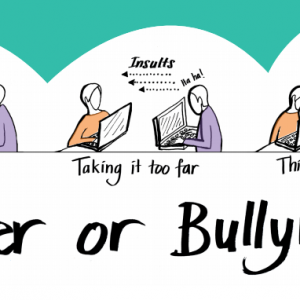National Children's Bureau: Banter or Bullying?

The National Children's Bureau have published an article entitled Banter or Bullying which addresses the perennial question of what is the difference between Bullying and Banter.
The article, written by Martha Evans, National Coordinator of the Anti-Bullying Alliance, goes on to describe what needs to be examined when you are looking at the difference between the two.
"Think carefully about the power relationship between the parties. Has the person experiencing it said they don’t like it? Does it involve numerous people? Does it target an aspect of their appearance or personality?
"Banter involves people with equal power, where there is no hurt involved and no intent to cause harm. In no way are we saying that people can’t make jokes but just be aware of the tipping point."
Our Preventing Bullying online training course has recently been updated in collaboration with our partners at Kidscape, a leading anti-bullying charity. The training course echoes this sentiment:
Is teasing/ ‘banter’ the same as bullying?
Teasing is common amongst friendship groups and familes. For the one doing the teasing it is a playful way of provoking a reaction, usually without an intention or desire to cause hurt.
It is important however that we support children to communicate when they feel a joke has gone too far. Even amongst family members and friendship groups it is possible to cross a line and offend or hurt a person’s feelings.
Banter can also be used as a way of reinforcing established group or social ‘norms’ and as such can run the risk of being discriminatory, even if it is not a bullying situation. For example, it is common to hear young people reinforcing gender stereotypes through banter (e.g ‘you run like a girl’), or to express homophobic attitudes (e.g ‘your haircut is so gay!’).
It is therefore vital to explain to children from a young age the difference between playful, harmless teasing, and that which can cause offence.
Dawn Jotham, EduCare's Product Development Lead for Education, commented: "On many occasions when I was dealing with bullying children their parents would say to me that what was said was 'only banter'. Banter can so easily have detrimental effects without the person teasing realising."
Return to news
